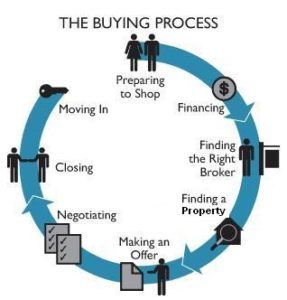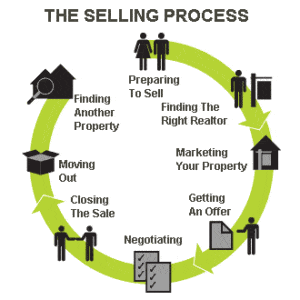Zillow: Has not yet broken the broker model

Zillow has increased public access to home listings through data aggregation and automated pricing, but has not been profitable recently or disrupted the real estate industry entirely.
Introduction to homebuying
How did you start the homebuying process 10 years ago? You scheduled an appointment with a real estate agent who was licensed by the state and had access to property listings in the region through the multiple listing service (MLS) systems, and the agent gave you a handful of listings that fit your criteria.[1]
How do you start the homebuying process today? 90% of people[2] hop online to sites like Zillow or Trulia to see listings, aggregated from MLS and posted by buyers themselves.
Zillow has taken the first step toward changing real estate, by democratizing real estate information, but has not disrupted the industry.
The complex real estate process
The homebuying process remains complex for both the seller and the buyer, leaving room for agents as middlemen.
The Need for Agents
While agents are no longer needed to curate listings, they are needed to schedule showings, facilitate negotiations and financing, and assist with closing.[3] Customers are not yet comfortable with buying and selling real estate directly to each other; in 2012, only 9% of homes were sold by the owner directly.[4]
The Cost of Agents
The seller pays 6% of the home’s sale price (3% to the buyer’s agent and 3% to the seller’s agent), the buyer pays the closing costs, and the agent pays the selling costs (advertising, open houses, etc.). Due to this structure, the agent may not have the customer’s best interests in mind (the principal-agent problem). Rather, agents are incentivized to sell quickly and accept suboptimal offers, resulting in selling prices that are 5.9-7.7% lower than they should be.[5]
Zillow’s business and operating model
Zillow was started by Spencer Rascoff in 2005[6], before going public for $80M in July 2011 and getting a secondary offering of $147M in the fall of 2012.[7] Zillow then acquired Trulia for $2.5B in February 2015, and both companies now sit under the Zillow Group.[8]
Customer Value: Public Property Listings
Data Availability
Capitalizing on internet and mobile channels, Zillow helps 124M consumers early in the homebuying cycle who want to explore their options and do online research before making complex buying decisions. Previously, agents were the gatekeepers of this information, but Zillow first gained permission from MLS to republish their listings and second negotiated data sharing/syndication agreements with data aggregators (who have entered data sharing agreements with national real estate companies). Zillow controls more than 70% of real estate searches, with 2/3 of visits (186 visits per second) coming from mobile.[9] [10]
Pricing Accuracy
Zillow creates value, beyond just a search engine, with its automated valuation model (AVM) called Zestimates. Zillow has published Zestimates on more than 100M homes across the country based on zillions of data points (yes, that’s why it’s called Zillow) pulled from public records and submitted by users. AVMs cannot factor in renovation premiums, the positioning and size of certain rooms, and architectural styles, but visual recognition may be able to detect these smaller details in the future.[11] Zillow has published an update to the algorithm and claims that this should reduce the median error rate from 8% to 6%.[12]
Agent Value: Advertising and Customer Relationships
Zillow provides agents, property management companies, mortgage lenders, and other businesses advertising space to reach customers in certain zip codes, charging them per impression. 92.3K agents have paid to join the Premier Agent Program (subscription and cost per click model) that gives them increased exposure in search results and allows them to manage customer relationships, generating $338/month per enrolled agent for Zillow.[13]
Company Profitability
In 2015, Zillow reported $615.2M in revenue, with 78% from services sold to real estate agents and property managers, 13% from display advertising, and 7% from mortgages.[14] Despite the $6B annual advertising spend by agents, Zillow reported a net loss of $91.1M and hasn’t been profitable since 2012, reflecting its approach to grow at all costs.[15] What’s concerning is that the company has reached scale—acquiring competitors and expanding market share—but has become less profitable each year.[16]
A comprehensive platform in the future
The logical next step for Zillow, which has high brand recognition and adoption, is to expand from a front-end platform to an all-in-one service that encourages buyers and sellers to transact directly. Zillow should develop back-end capabilities to schedule visits and coordinate inspections, and help buyers sign documents and finish closing. The business model should pivot to a subscription model, where buyers and sellers pay to use the platform and its services, perhaps with a small commission to Zillow for successful transactions.[17] Although it will be challenging, Zillow is uniquely positioned to disrupt real estate by providing digital avenues for what was traditionally done in person.
(799 words)
[1] http://www.inman.com/2015/08/17/disruption-could-come-from-the-direction-you-least-expect/
[2] http://www.bloomberg.com/news/articles/2013-03-07/why-redfin-zillow-and-trulia-havent-killed-off-real-estate-brokers
[3] http://www.inman.com/2015/08/17/disruption-could-come-from-the-direction-you-least-expect/
[4] http://www.bloomberg.com/news/articles/2013-03-07/why-redfin-zillow-and-trulia-havent-killed-off-real-estate-brokers
[5] http://www.bloomberg.com/news/articles/2013-03-07/why-redfin-zillow-and-trulia-havent-killed-off-real-estate-brokers
[6] http://www.businessinsider.com/zillow-chief-heres-why-we-can-be-a-billion-dollar-company-2012-4
[7] http://www.geekwire.com/2013/years-ipo-zillow-flying-high/
[8] http://www.wsj.com/articles/zillow-to-buy-real-estate-rival-trulia-1406551333
[9] https://medium.com/yalantis-mobile/what-technology-stack-do-zillow-redfin-and-realtor-com-use-for-property-listings-b6b1ba695618#.7bfs1ka60
[10] http://expandedramblings.com/index.php/zillow-statistics/
[11] http://blogs.wsj.com/cio/2016/11/11/zillow-develops-neural-network-to-see-like-a-home-buyer/
[12] http://www.housingwire.com/articles/33105-have-a-problem-with-a-zestimate-you-can-now-immediately-change-it; https://www.nerdwallet.com/blog/mortgages/putting-zillow-zestimates-accuracy-test/
[13] http://expandedramblings.com/index.php/zillow-statistics/
[14] http://investors.zillowgroup.com/releasedetail.cfm?releaseid=954622
[15] http://www.businessinsider.com/zillow-chief-heres-why-we-can-be-a-billion-dollar-company-2012-4
[16] http://seekingalpha.com/article/3959914-sales-growth-masks-problems-zillow-group
[17] http://www.inman.com/2015/08/17/disruption-could-come-from-the-direction-you-least-expect/; http://www.seattlepi.com/business/article/New-real-estate-site-aims-to-outdo-Zillow-like-10609313.php
“16 Amazing Zillow Statistics.” DMR. N.p., 14 July 2016. Web. 16 Nov. 2016.
Abrosimova, Kate. “What Technology Stack Do Zillow, Redfin and Realtor.com Use for Property Listings?” Medium. N.p., 04 Aug. 2015. Web. 16 Nov. 2016.
Bundrick, Hal M. “Putting Zillow Zestimates’ Accuracy to the Test – NerdWallet.” NerdWallet. Medium, 14 July 2016. Web. 16 Nov. 2016.
Castellanos, Sara. “Zillow Develops Neural Network to See Like a House Hunter.” WSJ. Wsj.com, 11 Nov. 2016. Web. 16 Nov. 2016.
Cook, John. “Zillow Is Flying High Two Years after IPO: Can This Stock Go Much Higher?” GeekWire. N.p., 19 July 2013. Web. 16 Nov. 2016.
Demay, Daniel. “New Real Estate Site Aims to Outdo Zillow, Redfin.” Seattlepi.com. Seattle Pi, 11 Nov. 2016. Web. 16 Nov. 2016.
Inman, Brad. “Who Faces Disruption in the Real Estate Industry?” Inman. Inman, 17 Aug. 2016. Web. 16 Nov. 2016.
Lane, Ben. “Problem with Your Zestimate? You Can Now Immediately Change It.” HousingWire RSS. N.p., 15 Feb. 2015. Web. 16 Nov. 2016.
Light, Joe. “In Zillow-Trulia Deal, Making Room for Brokers.” WSJ. Wsj.com, 28 July 2014. Web. 16 Nov. 2016.
Rosoff, Matt. “Zillow Chief: Here’s Why We Can Be A Billion-Dollar Company.” Business Insider. Business Insider, Inc, 26 Apr. 2012. Web. 16 Nov. 2016.
Stone, Brad. “Why Redfin, Zillow, and Trulia Haven’t Killed Off Real Estate Brokers.” Bloomberg.com. Bloomberg, 7 Mar. 2013. Web. 16 Nov. 2016.
Trainer, David. “Sales Growth Masks Problems At Zillow Group.” Seeking Alpha. N.p., 21 Mar. 2016. Web. 16 Nov. 2016.
Zillow Group. “Zillow Group Reports Fourth Quarter and Full Year 2015 Results.” Zillow Group Reports Fourth Quarter and Full Year 2015 Results (NASDAQ:ZG). Zillow Group, 11 Feb. 2016. Web. 16 Nov. 2016.





Very interesting post and well written! I completely agree that Zillow should (and probably could) have done more to date to disrupt the inefficient structure inherent to the real estate market. While the back-end systems that you mention around scheduling visits and inspections would certainly be a huge benefit to landlords or property sellers, I would be a little bit concerned with Zillow’s ability to finance a roll-out of these capabilities (also considering that it has never been profitable). This problem might only be exacerbated when considering that their existing customers – i.e. mostly real estate agents – will likely stop using Zillow as soon as they find out that the company is trying to disintermediate them. I still agree, however, that it is important to challenge the agents’ position in the market. As such maybe go for the easy, more immediately cash-generative wins first by selling in-person sales and marketing support (e.g. Zillow employee taking pictures and listing the property) to property owners. Sellers might then have to organize house viewings themselves or hire someone for that, however, they might just be ok with doing that for saving 6% on their purchase price (assuming US law allows this).
Fantastic post! One of your recommendations is: “The business model should pivot to a subscription model, where buyers and sellers pay to use the platform and its services, perhaps with a small commission to Zillow for successful transactions.” It seems as if this would be a lot harder in practice because of the competitive landscape of the industry. Other sites like Realtor.com and Trulia.com also offer the same information to customers that Zillow does. Because of the ease at which users can use both Zillow and competitors platform, it becomes an issue of multi-homing. If Zillow were to start charging customers for the service, I think consumers would immediately switch to use of the other providers. In order for this to be successful, all three of the big players would need to be on board. Furthermore, the relative price for these services has already been set at $0. Customers expect to get these services for free! To change user behavior/psychology would be very difficult unless Zillow can find additional offerings to make it worth it for consumers.
Another concern is that Realtor.com is actually owned by the National Association of Realtors[1]. The largest and most powerful organization in the residential broker industry, the NAR is an organization that is subscribed to by every residential real estate agent nationwide. The organization’s sway over the use of MLS information is one of my greatest concerns going forward. If Zillow ceased to have access to the MLS, it would no longer be able to offer up to date property information.
One rub point I see with Zillow and residential real estate agents is with the clients. A potential client accesses Zillow, finds all the information they need about their own home, including a valuation. This client calls the real estate agent whose ad(which they paid a lot of money for) popped up right next to their home information and set up a meeting. The agent comes to the house to have a meeting with a valuation of the home (based on market comps and other variables that Zillow can’t track). The potential buyer, because of Zillow’s algorithm and digitial valuation method, has their own idea of the value of the house. This potential discrepancy is a huge friction point between the agent and the client, and it was all caused by the company that put the two together, Zillow[2]. If Zillow wants to firm up its value prop to both sides of the deal, it really needs to look into compiling owner-specific information. For example, as you stated in your post, a remodel that the current owner of the home completed or a possible retrofitting that was completed on the property.
[1] http://www.housingwire.com/articles/38470-realtorcoms-traffic-is-growing-but-still-dwarfed-by-zillow
[2] CEO of ABC Real Estate (California Real Real Estate Brokerage. Personal Interview. Nov 30 2016
Thanks for the interesting post! I agree that the next step for Zillow would be to develop a full-service automated solution for the entire home buying and selling process. You may be interested in checking out a company, http://www.virgentrealty.com, that was started by a friend of mine and fellow HBS alum that aims to bring the entire home selling process online. They charge a flat $5,000 fee rather than the 3% commission so it avoids the principal-agent problem. Their model is that the seller can receive a valuation of their home online, receive free professional photos for the listing, manage showings through text messages, receive recommendations for each offer, and close the deal online. I believe this model could truly disrupt the real estate industry and listing companies like Zillow will need to match their services to remain relevant.